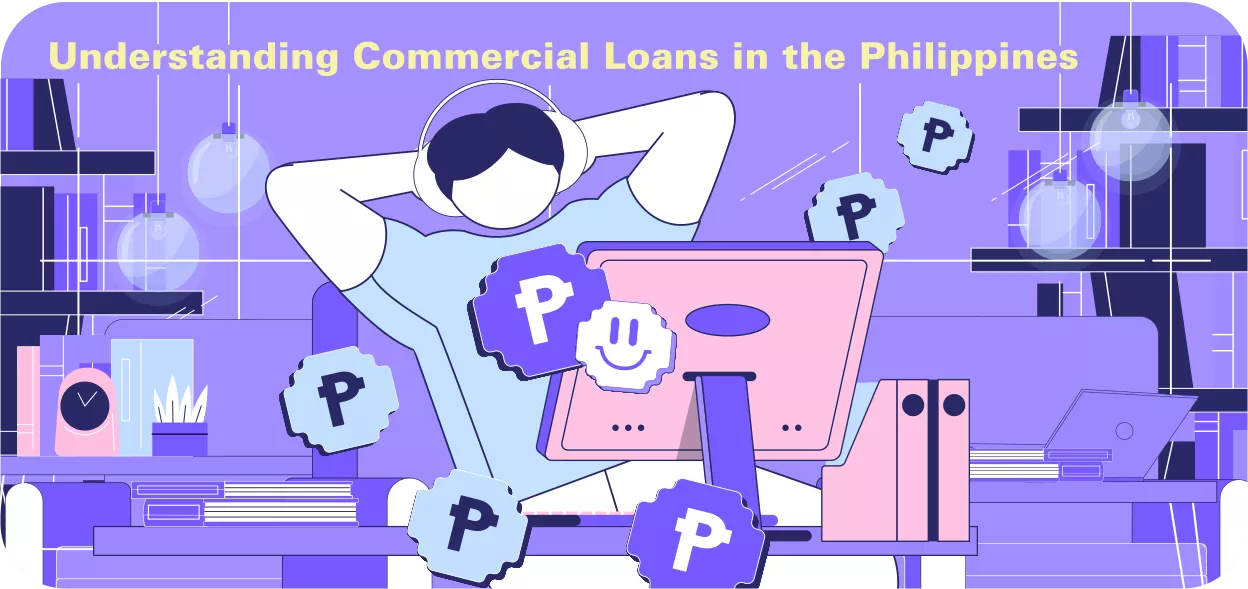Commercial break, luv!
Have this ever happened to you?! You have a business, and you think you’re ready to take it to the next level. It’s time to expand, luv, time to reach for the stars!
After crunching the numbers, you checked your business banking account, and it made you want to cry. It’s not that you’re broke, you’re actually doing well, but you just need extra cash to make your business dash.
Worry not, because we have the perfect loan for you – commercial loans!
In this blog, we’ll take you through the intricacies of commercial loans in the Philippines, including the eligibility criteria, the application process, alternative financing avenues, and more.
Commercial break over, luv. Let’s get back to regular programming.
Table of Contents
- What is a Commercial Loan?
- Types of Commercial Loans Available in the Philippines
- Key Lenders and Financial Institutions
- Eligibility and Application Process for Commercial Loans in the Philippines
- Step-by-Step Guide for Commercial Loans in the Philippines
- Commercial Loan Interest Rates and Fees
- Commercial Loan Repayment and Terms
- Collateral and Guarantees
- Alternative Financing Options in the Philippines

What is a Commercial Loan?
Commercial loans are loans that businesses can use to fund operations, expansion, or large-scale purchases. These loans are tailored for enterprises and typically come with various loan terms, interest rates, and structures. When handled responsibly, they can be tools to fuel growth and navigate the financial landscape.
TOCTypes of Commercial Loans Available in the Philippines
Commercial loans come in different shapes and sizes. Here are the different types of commercial loans available in the Philippines!
- Term Loans - Flexible financing with various terms for operational needs or expansion.
- Lines of Credit - Provides working capital solutions for day-to-day business operations.
- Commercial Real Estate Loans -Funding for property purchase and development projects.
- Equipment Financing - Options for purchasing or leasing business equipment.
- SME Loans - Tailored financial support for small and medium enterprises.
Key Lenders and Financial Institutions
If you’re ready for commercial loans, these are the key players you need to know. Make sure to shop around first, though, and find the one that best suits your needs!
Major Banks
- BDO (Banco de Oro) - Offering a spectrum of commercial loans, BDO is a banking giant known for its tailored financing solutions.
- Metrobank - Metrobank provides robust commercial lending options to fuel business growth.
- BPI (Bank of the Philippine Islands) - Known for its diverse financial services, BPI extends commercial loans to support various business needs.
Government Financial Institutions
- Land Bank of the Philippines - Land Bank supports agricultural businesses with specialized commercial financing.
- Development Bank of the Philippines (DBP) - DBP plays a crucial role in economic development by offering strategic financial solutions.
Non-Bank Financial Institutions and Microfinance Options
- Philippine Business for Social Progress (PBSP) - PBSP is a non-profit organization that supports socially responsible and sustainable businesses through financial services, including microfinance and commercial loans.
- Ahon Sa Hirap, Inc. (ASHI) - ASHI is a microfinance institution committed to empowering marginalized communities by providing financial services, including commercial loans, to small businesses and entrepreneurs.
- Center for Agriculture and Rural Development (CARD), Inc. - This is a microfinance institution dedicated to uplifting rural communities. It offers commercial loans to micro and small businesses, contributing to economic development in the agricultural sector and beyond.
Eligibility and Application Process for Commercial Loans in the Philippines
To manage the risks involved, lenders usually have a set of eligibility criteria for potential borrowers. This varies from lender to lender, but there are a few commonalities across the board. Here are a couple that you should know:
- Business Viability - Lenders assess the financial health and sustainability of the business.
- Creditworthiness - A good credit history enhances eligibility for commercial loans.
- Operational History - Lenders may prefer businesses with a proven track record.
- Collateral - Providing assets as collateral may be required for secured loans.
- Legal Compliance - Businesses should comply with relevant laws and regulations.
To asses your application, lenders of commercial loans may also ask for the following documents:
- Business Registration Documents - SEC or DTI registration.
- Financial Statements - Audited financial statements for the past years.
- Business Plan - Details on business operations, goals, and financial projections.
- Collateral Documents - Titles or deeds for pledged assets.
- Personal and Business Credit History - Credit reports of business owners and the company.
- Legal Documents - Contracts, permits, licenses, and other legal documents.
Step-by-Step Guide for Commercial Loans in the Philippines
Now that you know what makes you eligible for commercial loans and which documents to prepare, let’s go through the application process step-by-step!
Step 1: Determine Loan Purpose
Clearly define the purpose of the loan, whether for expansion, working capital, or equipment purchase. If you don’t need it, don’t borrow it.
Step 2: Assess Eligibility
Ensure your business meets the eligibility criteria outlined by the lender.
Step 3: Prepare Documentation
Gather all required documents, including financial statements and legal paperwork.
Step 4: Choose Lender
Research and select a lender that aligns with your business needs.
Step 5: Submit Application
Complete and submit the application form along with the necessary documents.
Step 6: Undergo Evaluation
The lender will assess your application, considering financial health, creditworthiness, and other factors.
Step 7: Receive and Review the Loan Offer
If approved, review the terms and conditions of the loan offer.
Step 8: Accept Terms
Upon agreement, fulfill any additional requirements and accept the loan terms.
Step 9: Disbursement
Once all requirements are met, the funds will be disbursed for business use.
TOCCommercial Loan Interest Rates and Fees
Interest rates for commercial loans can vary depending on who you're borrowing from. Factors that can affect these rates include the Bangko Sentral ng Pilipinas' (BSP) benchmark interest rate as well as the borrower's credit score, time in business, and the type of lender. Aside from interest rates, there are some associated fees and charges that you may have to pay when getting commercial loans:
- Origination fees - These are fees charged by lenders to cover the costs of processing and underwriting a loan. They can range from 0.5% to 5% of the loan amount
- Prepayment penalties - Some lenders may charge a fee if the borrower pays off the loan early
- Servicing fees - These are fees charged by lenders to cover the costs of managing and servicing the loan over its lifetime
Commercial Loan Repayment and Terms
It’s never too early to think about loan repayments and loan terms, luv, since it’s going to affect your experience, big time. So, let’s get into the nitty gritty.
Short Term Loans Vs. Long Term Loans
Commercial loans involve repayment schedules and terms. Lenders often offer flexible terms tailored to the borrower's needs.
Short-term loans may suit immediate needs with quicker repayment, while long-term loans provide a more extended payback period.
Choosing the right term is crucial, since shorter terms may mean higher monthly payments but lower overall interest, while longer terms offer lower monthly payments but potentially higher overall interest.
Understanding Fixed vs. Variable Interest Rates
Fixed rates ensure stability because – well, they’re fixed. You pay the same amount every month, making it easier for you to create a budget. On the other hand, variable rates may fluctuate with market conditions. They offer potential savings but introduce an element of uncertainty. That said, you should think things through thoroughly before deciding on a loan or lender.
TOCCollateral and Guarantees
If you’re going to go with secured loans, you’re going to need collateral. Collateral is a piece of property of yours that you will have to pledge in order to get a loan. This can be a vehicle or even business equipment. Here are the different types of collateral that lenders who offer commercial loans usually require:
- Real Estate - Property owned by the business or borrower, often land or buildings.
- Business Assets - Tangible assets such as equipment, inventory, or accounts receivable.
- Personal Assets - Personal property like homes, vehicles, or investments offered as security.
- Accounts Receivable - Unpaid customer invoices that act as collateral for the loan.
Offering collateral can strengthen the loan application but also poses risks, as the lender may seize the collateral in case of default.
For commercial loans specifically, there’s also something called a personal guarantee. This is a commitment by the business owner to repay the loan personally if the business cannot.
If a secured loan isn’t for you, you can always go for unsecured commercial loans. Although less common, they don't require collateral, and rely more on the borrower's creditworthiness and business strength for approval.
TOCAlternative Financing Options in the Philippines

Commercial loans aren’t for everyone. If they don’t fit your business needs right now, but need the financial assistance, you can always get funds from other means. Here are our suggested alternatives to commercial loans:
- Crowdfunding - Raising funds from a large number of people, often through online platforms.
- Peer-to-Peer Lending - Borrowing directly from individuals through online lending platforms.
- Borrowing from Friends and Family - You'll probably have an easier time convincing the people you love to lend you funds. Treat it like a loan, though. Pay it back as soon as it can or on the agreed upon time so as not to damage your personal relationships.
We’ve reached the end, luv. Now you’re ready to set out on your commercial loans journey. Remember, before you commit to your financing option (whether that be commercial loans or one of the alternative options) make sure you’ve assessed the specific needs of your business. Borrow only what you can, and pay your debts back on time.
Now go fund that business, luv. You can do it!






